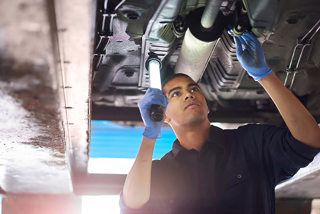Fleet operators must be more cautious of vehicle roadworthiness in the coming months as the coronavirus lockdown means some key maintenance and inspections will be deferred.
The Government has suspended the requirement for heavy goods vehicles (HGVs) and public service vehicles (PSVs) to have an MOT test for three months, while MOT expiry dates for cars have been extended by six months.
Maintenance is affected as some vehicles will be left parked for extended periods, while others will be used more frequently with limited opportunities for downtime.
Fleet operators and company vehicle drivers can still access emergency repair and maintenance services as some garages and workshops remain open, albeit in a limited capacity.
The closure of all non-essential retail sites was ordered on March 23, prompting car dealers to close their showroom doors immediately.
Most sites continue to offer some aftersales services, although routine servicing or non-essential repairs are being delayed to free up workshops in case they are needed to support key workers or the emergency services.
Corrine Barton, UK head of networks at Arval, said: “There has been a massive and quite sudden demand for fleets to be operational around the clock in response to the crisis, and this has created substantial new service and maintenance requirements.”
Leasing companies, manufacturers and dealers say they are working to meet the needs of large fleets where possible.
Sue Robinson, director of the National Franchised Dealers Association (NFDA), said: “Aftersales workshops and their technicians will play an important role in ensuring that critical vehicles can continue to operate safely and efficiently during these challenging times.”
TrustFord, part of the Ford Retail Group, is the UK’s largest Ford dealer group. It continues to provide aftersales services with a “skeleton staff”, while its Part Plus business also continues to operate.
Stuart Foulds, TrustFord chairman and chief executive, said: “We must play our own part in protecting the most vulnerable in our society and make sure the NHS and frontline services are able to function in the days and weeks ahead.”
Kia told Fleet News there is a limited number of dealers operating servicing facilities – in particular catering for the needs of key workers.
Jaguar Land Rover said more 50% of its service network is operating to provide essential maintenance and repair services to customers, while BMW said it is working with its retailers to establish what they are able to offer in terms of essential service and repair.
“Any fleet customer with urgent vehicle maintenance requirements which is unable to receive help through their normal channels should contact their BMW Key Account Manager for support,” a BMW spokesperson said.
Van and truck operators should expect a better service, with commercial vehicle service centres largely operating as usual.
With the coronavirus lockdown expected to last into May, it’s likely there will be a pool of vehicles that are overdue a service or require maintenance after being parked up or only used for short trips.
To give fleet operators and drivers peace of mind, the majority of manufacturers have extended the servicing intervals and warranty cover for their vehicles to cover this period.
PSA Group brands, including Peugeot and Vauxhall said customers can continue to use their vehicles provided the required maintenance is performed within three months or 1,800 miles of the specified service intervals.
Mercedes-Benz has increased servicing intervals to the sooner of 180 days past the current due date or the vehicle covering 3,728 miles after a service was required.
Epyx, which runs the 1link Service Network used by fleets operating around four million cars and vans, said fleets should not overlook the SMR advantages mobile mechanics can offer during the coronavirus pandemic.
Tim Meadows, vice-president and commercial director of Epyx, said: “For fleets that are involved in delivering essential services and transporting key workers, mobile can provide the means for more flexible SMR provision, ensuring that vehicles stay roadworthy that might otherwise be difficult to maintain and repair."
Advice for maintaining idle vehicles
Fleet operators can avoid a large number of breakdowns after the coronavirus lockdown is lifted by advising drivers of some basic care tips:
- Vehicles should be started and allowed to idle for 10-15 minutes at least once every two weeks to ensure the battery does not go flat.
- Moving the vehicle back and forth will prevent brakes from sticking and prevent tyres from forming flat spots.
- Bird droppings and other contaminants should be cleaned off the body and wheels to prevent damage to paint finish.
- When driving the vehicle for the first time, tyre pressures should be checked along with fluid levels.





















Login to comment
Comments
No comments have been made yet.